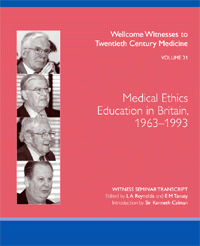Medical Ethics Education in Britain, 1963-1993
 Changing attitudes toward human experimentation along with other controversial moral issues emerged after the Second World War and, in 1963, led to the London Medical Group, organized by Ted Shotter, with similar Medical Groups emerging elsewhere from 1967. These became forums for discussion and debate arising from dilemmas encountered in medical settings. Medical ethics did not become a recognized subject in the syllabus of Britain's medical schools until 1993. This Witness Seminar transcript records the development of international ethical codes, the response to them over the period 1963-93 by students and doctors and the extent of resistance encountered from Deans, hospital administrators and others; the Groups' influence on medical practice; the impact on both Medical Group organizers and participants in their subsequent careers; the local and regional variations and their significant lasting contributions.
Changing attitudes toward human experimentation along with other controversial moral issues emerged after the Second World War and, in 1963, led to the London Medical Group, organized by Ted Shotter, with similar Medical Groups emerging elsewhere from 1967. These became forums for discussion and debate arising from dilemmas encountered in medical settings. Medical ethics did not become a recognized subject in the syllabus of Britain's medical schools until 1993. This Witness Seminar transcript records the development of international ethical codes, the response to them over the period 1963-93 by students and doctors and the extent of resistance encountered from Deans, hospital administrators and others; the Groups' influence on medical practice; the impact on both Medical Group organizers and participants in their subsequent careers; the local and regional variations and their significant lasting contributions.
The meeting was chaired by Dr Stephen Lock and included former Medical Group members, scientists, physicians and policy makers, such as Professors Kenneth Boyd, Bill Fulford, Roger Higgs, Bryan Jennett,, Sir Ian Kennedy, David Morton, and Sir Malcolm Macnaughton. An introduction by Professor Sir Kenneth Calman and appendices of the Very Revd Edward Shotter's reflections on the influence of the Medical Groups as a report for the Institute of Medical Ethics complete the transcript.
Introduction by Professor Sir Kenneth Calman, 241pp, 9 appendices, 12 figures, 2 tables, biographical notes, references, glossary and index.
Reynolds L A, Tansey E M. (eds) (2007) Medical ethics education in Britain, 1963–93, Wellcome Witnesses to Twentieth Century Medicine, vol. 31. London: The Wellcome Trust Centre for the History of Medicine at UCL.
ISBN 978 085484 1134




